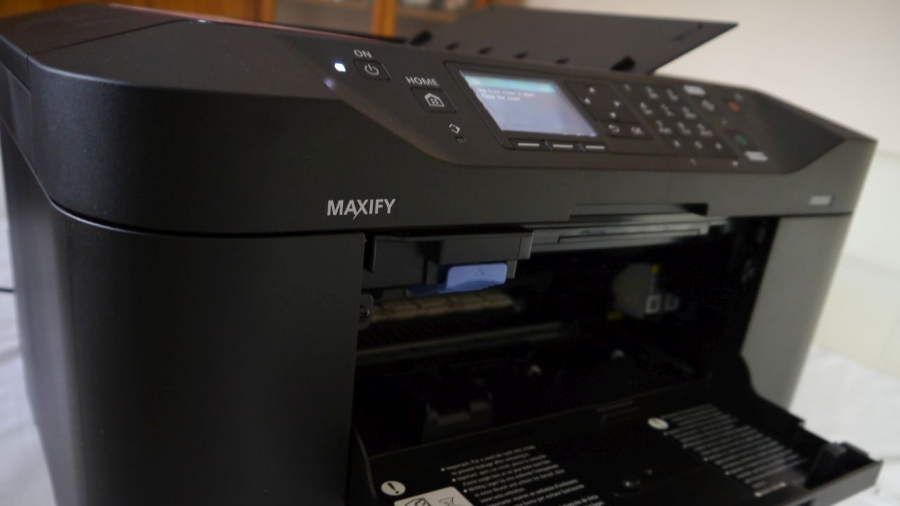Early Verdict
This is a solid budget offering which is definitely worth considering, as long as you can cope with its size and sluggish print speeds.
Pros
- +
Very cheap product
- +
Also reasonably priced consumables
- +
Three-year warranty
Cons
- -
Big and heavy
- -
Disappointing print speeds
- -
Lacks an Ethernet port
Why you can trust TechRadar
Like so many tech products, printers have now matured, and you now very rarely come across a device that is a complete dud, even at the very low-end of the market.
Sure, prices of ink cartridges are still high compared to the prices of the printers but the amount of technology now crammed into these products means that there is little, other than sheer speed, to differentiate between one printer and another costing twice the price.
Plus there's the fact that almost all new mainstream printers are all-in-ones (AIO), integrating a scanner, a printer and a fax. With all that in mind, we're reviewing the Maxify MB2050 which is the entry-level multi-function printer from Canon aimed at the SMB market.
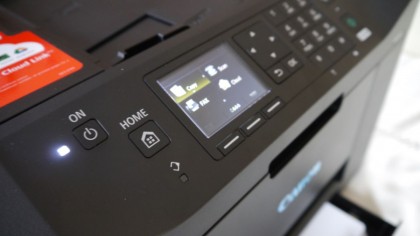
This is not a new product – it was launched in 2014 – but Canon confirmed that it will be on sale for the foreseeable future, further highlighting the fact that there's no reason to change a product if it works and can't be significantly improved.
The MB2050's original RRP was £159 (around $230, or AU$300) but it can be had for around half the price now (£79.98 at Currys and John Lewis – which is around $115, or AU$150) plus you can get an additional two-year warranty (to bring it to three in total) until March 2017.
Unlike some of its competitors, Canon didn't try to shrink this product. It is big – far bigger and heavier than we were expecting. Once you install some paper, it weighs nearly 11kg and has a footprint marginally smaller than two A3 sheets put together (this is an A4 printer).
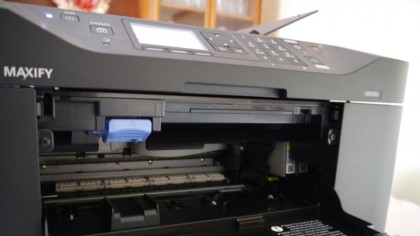
Bear that in mind if you're planning to put it on your desk next to your monitor. The MB2050 targets smaller businesses with a recommended duty cycle of only 1,000 pages per month, four times the capacity of its paper input cassette.
Sign up to the TechRadar Pro newsletter to get all the top news, opinion, features and guidance your business needs to succeed!
The printer can print at 1200 x 600 dpi, scan and copy at 1200 x 1200 dpi and fax at 300 dpi. There's also a 50-sheet auto document feeder. In terms of connectivity you've got a USB port, Wi-Fi, along with support for a wide variety of cloud-based services (Evernote, Dropbox) as well as cloud-based printing (Apple's AirPrint and Google's Cloud Print).
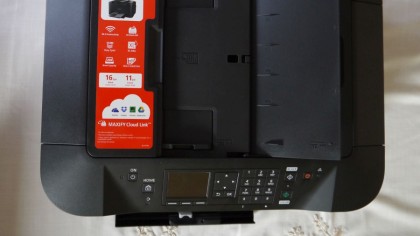
There's no card reader (not surprising given that this is not a consumer product), although an Ethernet port would have been welcome. If you're looking for one, the slightly more expensive MB2350 will suit you. It has a bigger paper tray, faster printing speeds and costs £20 extra (Currys).
A 2.5-inch LCD paired with the usual set of physical buttons are located on the front. The menu is fairly straightforward, and only offers a limited amount of customisation, not that this will matter at the lower-end of the SMB MFP market.
The MB2050 is rated at 16 pages per minute (mono) and 11 pages per minute (colour) with the first page emerging after eight and 12 seconds respectively. It does auto duplex and manages to produce borderless prints, a feature usually found on consumer-oriented MFPs.
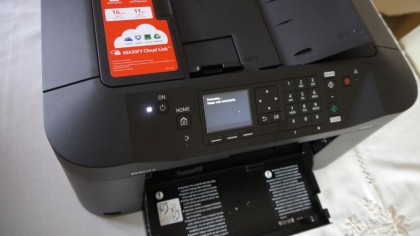
Real-life testing however proved to be much slower as expected. With the device connected via a USB cable (note that the printer doesn't come with one), the first sheet of our 31-page document was out in just under 50 seconds.
The job was done in 355 seconds, which translates into a real world printing speed of 5.5 pages per minute. Our testing used a 31-page PDF document (text heavy, no graphics with a few tables), a laptop running Windows 10 and default settings (i.e. we didn't use any specific drivers provided by Canon).
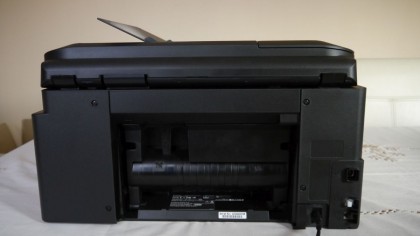
Copying proved to be faster with the 31 pages loaded in the ADF being scanned in 136 seconds, yielding a copy speed of around 14 pages per minute. Not too shabby.
Print quality was decent with text easily viewable even at a font size of 6pt. Your mileage will obviously vary depending on the quality of paper used, which in our case was office-type 80gsm.
When it comes to the cost of consumables, four XL cartridges (available as a multipack), which provide a rated 1,200 pages for black and an average yield of 900 pages (CMY), cost around £46 at Amazon and are certainly the better option.
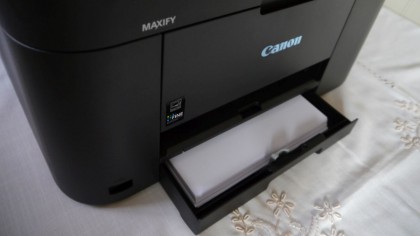
Early verdict
It is difficult to come up with a printing product that sports a unique selling point which others can't copy. HP's PageWide technology is one of these but it doesn't come cheap. That explains why Canon is keeping the same line-up at the very bottom of the market.
Longer product cycles translate into less R&D and marketing spend, which has a direct impact on the cost of the product. It's not surprising therefore to see the MB2050 available with a near 50% discount, and the price of its consumables are actually fairly reasonable.
As for the product itself, it left us wanting more. This MFP is ridiculously big and not as fast as we'd like it to be. Print speeds should have been better while copying speeds are more than adequate for a small office. We liked the fact that the ADF feature didn't cause us any headaches.
Overall, this is one worth shortlisting if you want a workhorse that doesn't cost the Earth, with a long warranty and cheap consumables.
- Also check out: Best printer: 15 top inkjet and laser printers

Désiré has been musing and writing about technology during a career spanning four decades. He dabbled in website builders and web hosting when DHTML and frames were in vogue and started narrating about the impact of technology on society just before the start of the Y2K hysteria at the turn of the last millennium.
What is a hands on review?
Hands on reviews' are a journalist's first impressions of a piece of kit based on spending some time with it. It may be just a few moments, or a few hours. The important thing is we have been able to play with it ourselves and can give you some sense of what it's like to use, even if it's only an embryonic view. For more information, see TechRadar's Reviews Guarantee.
